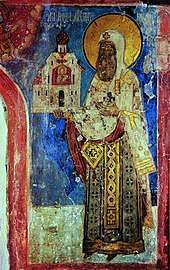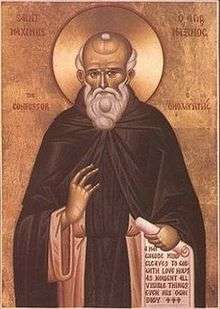November 5 (Eastern Orthodox liturgics)
November 4 - Eastern Orthodox liturgical calendar - November 6
All fixed commemorations below celebrated on November 18 by Eastern Orthodox Churches on the Old Calendar.[note 1]
For November 5th, Orthodox Churches on the Old Calendar commemorate the Saints listed on October 23.
Saints
- Apostles Patrobus, Hermas, Linus, Gaius, and Philologus, of the Seventy (1st century)[1][2][3]
- Martyrs Galacteon and his wife Episteme at Emesa (253)[1][2][4][5][note 2]
- Martyrs Domninus, Timothy, Theophilus, Theotimus, Dorotheus, Eupsychius, Carterius, Silvanus, Pamphilius, Philotheos, Nearchos and other martyrs of Palestine (307)[1][2][7][note 3]
- Martyr Castor the Bishop, by fire, and Martyr Agathangelus, by the sword.[2][8]
- Saint Domentius and Paul the Bishop.[2][9][note 4]
- Venerable Gregory, Patriarch of Alexandria, Confessor (9th century)[1][2][10][11]
Pre-Schism Western saints
- Saint Felix and Eusebius, martyrs in Terracina, between Rome and Naples in Italy (1st century)[12][note 5]
- Saint Domninus, first Bishop of Grenoble in France (4th century)[12]
- Saint Dominator, fourteenth Bishop of Brescia in Lombardy in Italy (c. 495)[6][12]
- Saint Fibitius, Abbot of a monastery in Trier in Germany, and the twenty-first bishop of that city (c. 500)[12][note 6]
- Saint Magnus, Archbishop of Milan in Italy from 520 to 525, Confessor (525)[12][note 7]
- Saint Laetus, a monk at the age of twelve, he is honoured near Orleans in France, his relics enshrined in the village of Saint-Lyé-la-Forêt (533)[12][note 8]
- Saint Cybi (Kybi, Kebius, Cuby), Abbot, of Cornwall and Wales (550)[1][13][note 9] (see also: November 8 )
- Saint Hermenegild, a monk at Salcedo in Galicia in Spain (586)[12]
- Saint Augustine and Paulinus, monks sent by St Benedict to found the monastery of Terracina in Italy (6th century)[12]
- Saint Kea (Kay, Kenan), Bishop of Devon and Cornwall (6th century)[13][note 10]
- Saint Bertilla (Berthild of Chelles), a nun at Jouarre near Meaux in France, who became Abbess of Chelles Abbey (c. 705)[12]
- Saint Spinulus (Spinula, Spin), a monk at Moyenmoutier with St Hidulf, later founder of the monastery of Bégon-Celle (now Saint-Blasien) (707 or 720)[12]
- Saint Kanten (Cannen), founder of Lianganten in Powys in Wales (8th century)[12]
- Saint Odrada, Virgin, of Balen, Netherlands (8th century)[1][13]
- Saint Gregory of Cassano, Calabria (1002)[1][13]
Post-Schism Orthodox saints
Other commemorations
- Consecration of the Church of Theodore Tyron, in the "Sforakio" district of Constantinople.[20][21][note 13]
- Election to the patriarchal throne of St. Tikhon, Patriarch of Moscow and All Rus (1917)[13][15]
- Repose of Abbess Anna of Vraćevšnica monastery, Serbia (1975)[1]
- Repose of Hieromonk Raphael (Ogorodnikov) of Porkhov, Pskov (1988)[1]
Icon gallery
.jpg) Martyrs Galacteon and his wife Episteme at Emesa.
Martyrs Galacteon and his wife Episteme at Emesa. St. Jonah, Archbishop of Novgorod.
St. Jonah, Archbishop of Novgorod.- Church of Theodore Tyron, in the "Sforakio" district of Constantinople.
Notes
- The notation Old Style or (OS) is sometimes used to indicate a date in the Julian Calendar (which is used by churches on the "Old Calendar").
The notation New Style or (NS), indicates a date in the Revised Julian calendar (which is used by churches on the "New Calendar"). - "At Emesa, in Phoenicia, during the persecution of Decius, the holy martyrs Galation, and Epistemis, his wife, who were scourged, had their hands, feet and tongue severed from their bodies, and finally consummated their martyrdom by decapitation."[6]
- "Also, the holy martyrs Domninus, Theotimus, Philotheus, Silvanus, and their companions, under the emperor Maximinus."[6]
- These are absent from the Synaxaria. However they are referenced in the Jerusalemitic Canonarion.
- "At Terracina, in Campania, the birthday of the holy martyrs, Felix, priest, and Eusebius, monk. The latter having buried the holy martyrs Julian and Caesarius, and converted to the faith of Christ, many whom the priest St. Felix baptized, was arrested with him, and both being led to the tribunal of the judge, who could not succeed in intimidating them, they were shut up in prison, and as they refused to offer sacrifice, were beheaded that same night."[6]
- "At Treves, St. Fibitius, who was made bishop of that city while filling the office of abbot."[6]
- "At Milan, St. Magnus, bishop and confessor."[6]
- "At Orleans, in France, St. Lsetus, priest and confessor."[6]
- Rev. Richard Stanton lists "St. Kybi, or Kebius" on November 6, as follows:
- "ST. KYBI was the son of Saloman, King of Brittany, and member of a family which produced several Saints in the Church of God. Kybi early in life devoted himself to the ecclesiastical state,and is said to have been consecrated Bishop by St. Hilary of Arles; but he fled from the honours due to him in his own country, and visited Great Britain and Ireland. Finally he settled himself in Anglesey, and became the Apostle of that island, where he ended his days in peace."[14]
- A saint who gave his name to Landkey in Devon, now in England. He spent some of his life in Brittany where he is venerated as St Quay.
- See: (in Russian) Иона (архиепископ Новгородский). Википедии. (Russian Wikipedia).
- See: (in Russian) Масленников, Гавриил Михайлович. Википедии. (Russian Wikipedia).
- The complex represents one of the most important examples of Comnenian and Palaiologan architecture of Constantinople.
gollark: I mean, I would be on board with this, but GTech™ memetic engineering is apparently very undirected and I probably can't engineer an uprising properly.
gollark: Create an uprising against lyricly?
gollark: What do you mean "rise up"?
gollark: I moderate very moderately, especially since I didn't actually become a moderator and have no powers.
gollark: See, I helped with EWO and the multiplayer lambda calculus thing recently.
References
- November 5/November 18. Orthodox Calendar (PRAVOSLAVIE.RU).
- (in Greek) Συναξαριστής. 5 Νοεμβρίου. ECCLESIA.GR. (H ΕΚΚΛΗΣΙΑ ΤΗΣ ΕΛΛΑΔΟΣ).
- Apostle Patrobus of the Seventy. OCA - Lives of the Saints.
- Great Synaxaristes: (in Greek) Οἱ Ἅγιοι Γαλακτίων καὶ Ἐπιστήμη. 5 Νοεμβρίου. ΜΕΓΑΣ ΣΥΝΑΞΑΡΙΣΤΗΣ.
- Martyr Galaction and his wife at Emesa. OCA - Lives of the Saints.
- The Roman Martyrology. Transl. by the Archbishop of Baltimore. Last Edition, According to the Copy Printed at Rome in 1914. Revised Edition, with the Imprimatur of His Eminence Cardinal Gibbons. Baltimore: John Murphy Company, 1916. p. 342.
- Great Synaxaristes: (in Greek) Οἱ Ἅγιοι Δομνῖνος, Τιμόθεος, Θεόφιλος, Θεότιμος, Δωρόθεος ὁ Πρεσβύτερος, Εὐψύχιος, Καρτέριος, Σιλβάνος, Πάμφιλος, Φιλόθεος, Νέαρχος καὶ ἄλλοι Ἅγιοι Μάρτυρες ἄνδρες καὶ γυναῖκες. 5 Νοεμβρίου. ΜΕΓΑΣ ΣΥΝΑΞΑΡΙΣΤΗΣ.
- Great Synaxaristes: (in Greek) Οἱ Ἅγιοι Κάστορας καὶ Ἀγαθάγγελος οἱ Μάρτυρες. 5 Νοεμβρίου. ΜΕΓΑΣ ΣΥΝΑΞΑΡΙΣΤΗΣ.
- Great Synaxaristes: (in Greek) Οἱ Ἅγιοι Δομέντιος καὶ Παῦλος ὁ Ἐπίσκοπος. 5 Νοεμβρίου. ΜΕΓΑΣ ΣΥΝΑΞΑΡΙΣΤΗΣ.
- Great Synaxaristes: (in Greek) Ὁ Ὅσιος Γρηγόριος. 5 Νοεμβρίου. ΜΕΓΑΣ ΣΥΝΑΞΑΡΙΣΤΗΣ.
- St Gregory the Archbishop of Alexandria. OCA - Lives of the Saints.
- November 5. Latin Saints of the Orthodox Patriarchate of Rome.
- November 18 / November 5. HOLY TRINITY RUSSIAN ORTHODOX CHURCH (A parish of the Patriarchate of Moscow).
- Rev. Richard Stanton. A Menology of England and Wales, or, Brief Memorials of the Ancient British and English Saints Arranged According to the Calendar, Together with the Martyrs of the 16th and 17th Centuries. London: Burns & Oates, 1892. pp. 526-527.
- (in Russian) 5 ноября по старому стилю / 18 ноября по новому стилю. Русская Православная Церковь - Православный церковный календарь на 2015 год.
- Great Synaxaristes: (in Greek) Ὁ Ἅγιος Ἰωνᾶς ὁ Θαυματουργός. 5 Νοεμβρίου. ΜΕΓΑΣ ΣΥΝΑΞΑΡΙΣΤΗΣ.
- Repose of St Jonah the Archbishop of Novgorod. OCA - Lives of the Saints.
- (in Russian) ГАВРИИЛ. Православная Энциклопедия под редакцией Патриарха Московского и всея Руси Кирилла (электронная версия). (Orthodox Encyclopedia - Pravenc.ru).
- The Autonomous Orthodox Metropolia of Western Europe and the Americas (ROCOR). St. Hilarion Calendar of Saints for the year of our Lord 2004. St. Hilarion Press (Austin, TX). p. 83.
- Great Synaxaristes: (in Greek) Ἐγκαίνια ναοῦ Θεοδώρου Τήρωνος ἐν τοῖς Σφωρακίου. 5 Νοεμβρίου. ΜΕΓΑΣ ΣΥΝΑΞΑΡΙΣΤΗΣ.
- (in Greek) 05/11/2015. Ορθόδοξος Συναξαριστής.
Sources
- November 5/November 18. Orthodox Calendar (PRAVOSLAVIE.RU).
- November 18 / November 5. HOLY TRINITY RUSSIAN ORTHODOX CHURCH (A parish of the Patriarchate of Moscow).
- November 5. OCA - The Lives of the Saints.
- The Autonomous Orthodox Metropolia of Western Europe and the Americas (ROCOR). St. Hilarion Calendar of Saints for the year of our Lord 2004. St. Hilarion Press (Austin, TX). p. 83.
- The Fifth Day of the Month of November. Orthodoxy in China.
- November 5. Latin Saints of the Orthodox Patriarchate of Rome.
- The Roman Martyrology. Transl. by the Archbishop of Baltimore. Last Edition, According to the Copy Printed at Rome in 1914. Revised Edition, with the Imprimatur of His Eminence Cardinal Gibbons. Baltimore: John Murphy Company, 1916. p. 342.
- Rev. Richard Stanton. A Menology of England and Wales, or, Brief Memorials of the Ancient British and English Saints Arranged According to the Calendar, Together with the Martyrs of the 16th and 17th Centuries. London: Burns & Oates, 1892. p. 526.
Greek Sources
- Great Synaxaristes: (in Greek) 5 ΝΟΕΜΒΡΙΟΥ. ΜΕΓΑΣ ΣΥΝΑΞΑΡΙΣΤΗΣ.
- (in Greek) Συναξαριστής. 5 Νοεμβρίου. ECCLESIA.GR. (H ΕΚΚΛΗΣΙΑ ΤΗΣ ΕΛΛΑΔΟΣ).
- (in Greek) 05/11/2015. Ορθόδοξος Συναξαριστής.
Russian Sources
- (in Russian) 18 ноября (5 ноября). Православная Энциклопедия под редакцией Патриарха Московского и всея Руси Кирилла (электронная версия). (Orthodox Encyclopedia - Pravenc.ru).
- (in Russian) 5 ноября по старому стилю / 18 ноября по новому стилю. Русская Православная Церковь - Православный церковный календарь на 2015 год.
This article is issued from Wikipedia. The text is licensed under Creative Commons - Attribution - Sharealike. Additional terms may apply for the media files.

